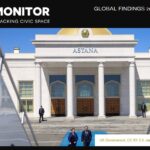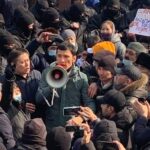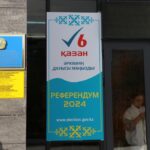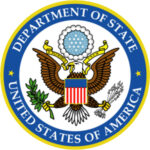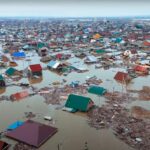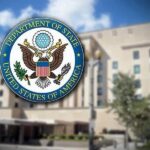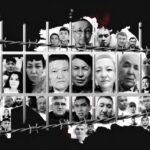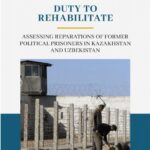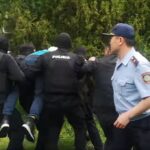Executive Summary
The constitution provides for religious freedom; however, the government used certain laws and policies to restrict the religious freedom of groups deemed by the government to be “non-traditional,” using methods such as arrests, fines, and raids. The government allowed religious groups it deemed “traditional” to operate with fewer restrictions. Respect for religious freedom declined during the year. The government continued to apply stringent mandatory registration requirements on missionaries and religious groups, and required an “expert examination” of religious literature before allowing its importation. Although most religious groups successfully completed the registration process in 2012, some were denied registration, and continued to seek registration during the year. The Church of Unification, which previously had been denied registration, was granted registration during the year. Other groups, such as the Scientologists and Ahmadi Muslims, continued to be denied registration based on their religious beliefs. The government required all Muslim groups to join the Sunni Hanafi Spiritual Administration of Muslims in Kazakhstan (SAMK) to obtain registration.
There were reports of societal discrimination based on religious affiliation, belief, or practice. Muslim, Russian Orthodox, Roman Catholic, Lutheran, and Jewish leaders reported high levels of acceptance in society.
The Ambassador and other U.S. officials engaged in extensive private and public dialogue with the government to urge respect for religious freedom and fair implementation of the law on religious activities consistent with the country’s constitutional provisions for religious freedom and with its international commitments.
Section I. Religious Demography
The U.S. government estimates the total population at 17.7 million (July 2013 estimate). Approximately 65 percent of the population is Muslim, the majority of the Sunni Hanafi school. Other Islamic groups that account for less than 1 percent of the population include Shafi’i Sunni, Shia, Sufi, and Ahmadi.
Russian Orthodox Christians constitute approximately 25 percent of the population. Other groups constituting less than 5 percent of the population include Jews, Roman Catholics, Greek Catholics, Lutherans, Presbyterians, Seventh-day Adventists, Methodists, Mennonites, Pentecostals, Baptists, Jehovah’s Witnesses, The Church of Jesus Christ of Latter-day Saints (Mormons), Christian Scientists, Buddhists, Hare Krishnas, Bahais, Scientologists, and members of the Unification Church.
Section II. Status of Government Respect for Religious Freedom
Legal/Policy Framework
The constitution defines the country as a secular state and provides for freedom of religion and belief or freedom to decline religious affiliation. Other laws and policies, however, mandate restrictive registration requirements for religious organizations and missionaries, require government inspection of religious literature, and prohibit religious ceremonies in government buildings (including those belonging to the military or law enforcement) and in secular education institutions.
According to the law, in order to register at the local level, a religious group must submit an application listing the names and addresses of at least 50 founding members to the Ministry of Justice (MOJ). Communities may only practice within the geographic limits of the locality in which they register unless they have sufficient numbers to register at the regional or national level. Only groups registered at the national level have the right to open educational institutions. To register regionally, groups must have 500 members in each of two separate regions, while national registration requires at least 5,000 total members with sufficient representation in each of the country’s oblasts (regions). According to the Religious Affairs Agency (RAA), there are approximately 3,100 registered religious organizations in the country, representing 17 major groups. Several other religious groups, including the Church of Scientology and the Ahmadiyya Muslim community, exist in the country but have been denied registration or have not sought registration.
To obtain legal registration, the law requires that mosques affiliate with the Sunni Hanafi SAMK, a national organization closely tied to the government and led by a chief mufti based in Almaty. Muslim groups choosing not to be subject to the SAMK’s direction are denied registration. By joining the SAMK, Muslim communities relinquish their rights to appoint their own imam and to hold services in a language other than Kazakh. They also forfeit their property and 30 percent of their mosque’s income to the SAMK.
The law allows everyone to follow his or her religious or other convictions, take part in religious activities, and disseminate his or her beliefs, with significant restrictions. The law states that the government shall not interfere with the choice of religious beliefs or affiliation of citizens or residents, unless those beliefs are directed against the country’s constitutional framework, sovereignty or territorial integrity. The law also states that the government shall not interfere with parents’ rights to rear their children consistent with their religious convictions, unless such an upbringing harms the child’s health or infringes on the child’s rights. The law prohibits forced conversion of persons to any religion, forced participation in a religious group’s activities, or forced participation in religious rites. The law also prohibits coercive religious activities that harm the health or morale of citizens or residents of Kazakhstan, or force them to end marriages or family relations. Unregistered missionary activity is prohibited, as are certain methods of proselytizing, such as the use of charity, blackmail, violence or the threat of violence, or the use of material threats to coerce participation in religious activities.
The law allows registration to be denied to religious groups based on an insufficient number of adherents or inconsistencies between the religious group’s charter and any national law, as determined by an “expert analysis” conducted by the RAA.
Police, prosecutors, and citizens may petition a court to suspend the activities of a registered group for failure to rectify violations or for repeated violations of the law. The Administrative Code stipulates a three-month suspension for registered groups that hold illegal gatherings, disseminate unregistered religious materials, systemically pursue activities that contradict the charter and bylaws of the group as registered, construct religious facilities without a permit, or otherwise defy the constitution or laws. During a suspension, the group is prohibited from speaking with the media, from holding meetings, gatherings, or services, and from undertaking financial transactions other than continued contractual obligations, such as paying salaries. If a religious group engages in activities prohibited by law or fails to rectify the violations that led to a suspension, the government may ban the group.
The law also allows authorities to suspend the activities and fine the leaders of unregistered groups. If a religious group engages in a prohibited activity or fails to rectify violations resulting in a suspension, its leader is subject to a fine of 485,400 tenge ($3,160) if the group is not registered, or 809,000 tenge ($5,267) if the group is registered as a legal entity. If a group engages in activities not specified in its charter, its leaders are subject to fines of 323,600 tenge ($2,107) if the group is not registered, or 485,400 tenge ($3,160) if the group is registered as a legal entity. If a group holds gatherings or conducts charitable activities in violation of the law, imports, publishes and/or disseminates illegal religious literature or other materials, or constructs an unregistered building, its leaders are subject to fines of 161,800 tenge ($1,053) for unregistered groups or 323,600 tenge ($2,107) for legal entities.
The RAA is responsible for the formulation and implementation of state policy on religious freedom. The agency also studies and analyzes the status of religions, the operation of religious groups, and the activities of missionaries. It drafts legislation and regulations, conducts analyses of religious materials, considers problems related to violations of the religion law, cooperates with law enforcement to ban the operation of religious groups or individuals who violate the religion law, coordinates actions of local government to regulate religious problems, and provides official interpretation of the religion law.
The extremism law, which applies to religious groups and other organizations, gives the government discretion to identify and designate a group as an extremist organization, ban a designated group’s activities, and criminalize membership in a banned organization. Prosecutors have the right to inspect annually all groups registered with state bodies, and regularly conduct such inspections.
Local and foreign missionaries are required to register annually with the MOJ and provide information on their religious affiliation, intended territory of missionary work, and time period for conducting that work. All literature and other materials intended to support their missionary work must be submitted together with their registration application. Use of materials not vetted during the registration process is illegal. A missionary must produce registration documents and power of attorney from the sponsoring religious organization in order to work on behalf of the organization. The MOJ may refuse registration to missionaries whose work “constitutes a threat to the constitutional order, social order, the rights and freedoms of individuals, or the health and morals of the population.”
Foreign missionaries must obtain and present RAA approval to the MOJ when applying for a missionary visa. The RAA can reject missionaries based on a negative assessment from its religious experts, or if it deems that the missionaries represent a danger to the country’s constitutional framework, citizens’ rights and freedoms, or any person’s health or morals. Missionary visas permit a person to stay in the country for a maximum of six months per 12-month period. Missionary visa applicants must obtain RAA consent every time they apply for a visa. In addition to a religious visa, foreign missionaries must obtain a permit to speak about their religion with those outside their own religious group. They must carry this document with them at all times. The constitution requires foreign religious groups to conduct their activities, including appointing the heads of local congregations, “in coordination with appropriate state institutions.” Foreigners may not register religious groups.
The law does not permit religious instruction in public schools. Homeschooling is not permitted for religious reasons. Parents may enroll children in supplemental religious education classes provided by registered religious groups.
The law requires organizations to “take steps not to attract anyone under the age of 18, and/or to prevent anyone under the age of 18 from participating in the activities of a religious association” should a parent or legal guardian object. The law bans religious or proselytizing activities in children’s holiday, sport, creative or other leisure organizations, camps, or sanatoria. The extent to which organizations must prevent underage persons’ involvement in religious activity is not specifically outlined and has not been further defined by authorities. Educational licensing regulations do not permit religious groups to educate children without approval from the Ministry of Education.
The election law prohibits political parties based upon religious affiliation. The criminal code prohibits the incitement of interethnic or interreligious hatred.
Government Practices
The government imposed restrictions that mostly affected members of religious groups the government deemed to be non-traditional, such as Evangelical Christians, Jehovah’s Witnesses, and Muslim communities unaffiliated with the SAMK. The government applied laws governing unregistered religious activity unevenly and local and national law enforcement authorities prosecuted and fined these “non-traditional” religious groups for conducting illegal or unsanctioned educational, religious, or entrepreneurial activities. In practice, courts frequently interpreted any religious activity that took place outside of a registered religious building as “illegal missionary activity,” including invitations to religious services and discussions on religious topics.
Many religious organizations criticized the intrusive nature of the registration process, which required information about ethnicity, family status, religious education, employment, and political affiliation. The number of members required for regional registration or national registration continued to make it very difficult for smaller religious groups to register and impossible for any group other than the SAMK and the Russian Orthodox Church to register at the national level. Some groups were also denied registration based on their theological position. For example, the Ahmadiyya Muslim community continued to be denied registration because their theology differed from mainstream Islam and government experts had determined that they could not be considered Muslims.
The authorities harassed and discriminated against “non-traditional” religious groups through a range of means, including, but not limited to: frequent inspections by tax and other authorities, denial or delays of permits for constructing houses of worship, the non-issuance of visas to missionaries, prolonged analysis of religious materials including those of the Jehovah’s Witnesses, and persecution of pastors of unregistered and minority Protestant religious groups.
On April 6, authorities interrupted a peaceful gathering of approximately 30 Jehovah’s Witnesses in a private home in the eastern town of Karabalyk. According to those present, more than 20 law enforcement officials, including representatives of the Regional Department on Fighting Against Extremism, Separatism, and Terrorism and the Regional Department of Religious Affairs, along with the regional and city police and the criminal investigator, entered the home without permission and interrupted the meeting. They seized several Bibles and pieces of religious literature belonging to those present.
Government officials continued to express concern regarding the potential spread of “political and religious extremism.” The Committee for National Security continued to characterize the fight against what it termed “religious extremism” as a top priority of the internal intelligence service and expanded its monitoring of civil society and religious groups. Over the past two years, officials banned over 573 Web sites due to “extremist content.”
On May 17, police arrested Bakhytzhan Kushkumbaev, the Protestant pastor of Grace Church in Astana, after he had been accused of causing psychological harm to a member of the congregation based on a statement made by the member’s relative. The alleged victim in the case denied that Kushkumbaev had caused her any harm, but authorities held the pastor for two months in a pretrial detention center before transferring him for one month to a psychiatric center for a forced psychological examination. After the examination was complete, the authorities returned Kushkumbaev to the pretrial detention center in Astana, where he continued to await trial. On October 7, due to his advanced age and declining health, a court ordered Kushkumbaev be transferred to house arrest pending his trial and on October 8 he was briefly released from custody. Moments later, however, the police re-arrested Kushkumbaev under new charges of propagating terrorism and extremism, an offense punishable by up to ten years in prison, and placed him back in custody. Kushkumbaev remained in the pretrial detention center in Astana at the end of the year.
Several government-controlled media outlets and government-funded nongovernmental organizations (NGOs) continued to publish or broadcast stories critical of “non-traditional” religious groups, including evangelical Protestant groups, Jehovah’s Witnesses, and Scientologists, depicting them as dangerous “sects” harmful to society.
On October 16, the KTK television channel aired a program targeted at two large charismatic Christian communities, the New Life and Grace Churches. The program reported that many “victims” of these “sects” were requesting help from anti-sect centers, and warned viewers that these non-traditional religious organizations used hypnosis and hallucinogenic drinks to influence their congregations. The program also claimed that because these churches “prepared believers for death,” they were increasing the number of suicides.
The Baptist Council of Churches reported several administrative court cases against individual Baptists throughout the country for participating in the activities of an unregistered group. In at least three instances, pastors were fined 173,100 tenge ($1,127). The Baptist Council of Churches had a policy neither to seek nor accept registration in former Soviet countries.
Imam Mukhammad Toleu of the unregistered Fatikha Mosque in Aktobe lost his appeal of an administrative fine of 86,550 tenge ($563) levied against him on September 27 for leading prayers in an unauthorized location. The city court had ruled in 2011 that the house used by the mosque was a residential property and banned the owners from using the property for worship.
Several registered Protestant groups, including New Life Church and Grace Church, unregistered members of the Baptist Council of Churches, and registered congregations of Jehovah’s Witnesses reported that the authorities closely monitored their religious gatherings and sometimes conducted disruptive raids during religious services. On March 31, police disrupted the Easter service of the New Life Pentecostal Church in Stepnogorsk in the Akmola region because the visiting pastor was only accredited to preach in the region of Karaganda.
Courts typically fined individuals found guilty of unregistered religious or missionary activity. During the year, 21 members of the Jehovah’s Witness community were convicted of illegal missionary activity and were fined 173,100 tenge ($1,127) each. On January 15, the Aktau Administrative Court convicted Nadezhda Shefer of illegal missionary activity after she had been seen publicly discussing her religious beliefs with interested persons in an apartment building. On February 11, the Mangistau Regional Court upheld the conviction, and at the conclusion of the hearing, the judge warned the more than 30 members of Jehovah’s Witnesses in attendance that it was illegal for them to preach outside their religious building. In addition, at least two members of Jehovah’s Witnesses – a citizen of Poland and a citizen of Kyrgyzstan – were ordered to be deported after being convicted of illegal missionary activity.
The Sunni Hanafi SAMK continued to exercise significant control over the activities of Muslim groups, including mosque construction, imam appointments, and the administration of examinations and background checks for aspiring imams. The SAMK was the primary coordinator of Hajj travel and was responsible for authorizing travel agencies to provide Hajj travel services to citizens. The Din-Mohammad Mosque in Petropavlovsk, in an effort to protect its property from forfeiture to the SAMK, continued to seek registration independently, but was denied registration in March. The community appealed the decision, but without result as of the end of the year.
The authorities interpreted any religious activity conducted by visiting foreigners as missionary activity and expelled those who were not registered as missionaries. The Ministry of Internal Affairs (MOI) reported that it identified 67 unregistered missionaries, including 13 foreigners, operating during 2012, the latest year for which data was available. Of the foreign missionaries, five were deported, two were fined 184,000 tenge ($1,200) each, and six were given warnings.
Section III. Status of Societal Respect for Religious Freedom
There were reports of societal discrimination based on religious affiliation, belief, or practice. Observers noted increased discrimination against religious minorities. Several government-supported “anti-sect” organizations portrayed some “non-traditional” religious groups as harmful. Members of these religious groups complained that the “anti-sect” organizations disrupted religious services or attempted to intimidate parishioners through threats of legal action. They also reported that these organizations attempted to discredit some religious groups through programs in schools and in the community. Scientologists reported that several local businesses in Almaty refused to rent them space to hold gatherings as a result of this activity.
Many individuals were wary of “non-traditional” religious groups, particularly those that proselytized. There were several reports of citizens filing complaints with authorities after their family members became involved with such groups, and on August 27, the RAA announced that the organization “Ules-2020” had launched a hotline to respond to citizens concerned about “dangerous religious sects.” The RAA explained that professional legal and religious experts as well as psychologists would be available 24 hours a day to provide confidential consultations to people concerned about strange religious ideas, the spread of dubious religious literature in public, religious campaigns, and suspicious meetings of a religious nature.
Leaders of the five religious groups the government considered “traditional” – Sunni Hanafi Islam (as represented by the SAMK), Russian Orthodoxy, Roman Catholicism, Lutheranism, and Judaism – reported general acceptance and tolerance that other religious groups did not enjoy.
Section IV. U.S. Government Policy
In discussions with government officials and in public statements, U.S. officials emphasized the importance of respecting religious freedom and noted that bilateral cooperation on economic and security matters was a complement to, not a substitute for, meaningful progress on religious freedom.
The Ambassador, embassy officers, and other U.S. government officials met with senior host government officials and members of religious groups to raise concerns over the 2011 religion law. U.S. officials encouraged the government to implement the religion law fairly, consistent with the country’s constitutional provisions and international commitments to respect individuals’ rights to peaceful expression of religious beliefs. U.S. officials expressed concern that the broad scope of the law enabled authorities, particularly at the local level, to apply it in an arbitrary manner.
Embassy and other Department of State officials visited houses of worship in several regions of the country, met with religious leaders, and brought specific cases of concern to the attention of government officials and urged their resolution.
The U.S. embassy also maintained contact with a wide range of religious communities and religious freedom advocates, and reported on violations of their rights to engage in religious practice.
Embassy officials attended public events in support of religious communities and participated in roundtables and other public debates on religious freedom and tolerance. U.S. government representatives were in regular contact with NGOs that followed religious freedom topics, including the Almaty Helsinki Committee, the Association of Religious Organizations of Kazakhstan, and the Kazakhstan Bureau of International Human Rights and Rule of Law.
SOURCE:
http://www.state.gov/j/drl/rls/irf/religiousfreedom/index.htm#wrapper


